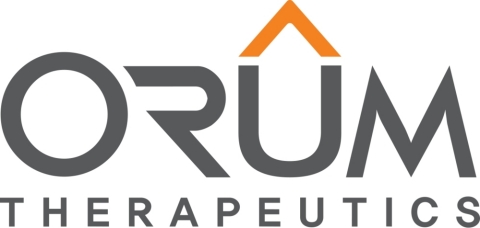Orum Therapeutics Presents Positive Preclinical Data of ORM-6151, a First-in-Class, CD33-GSPT1 Dual-Precision Targeted Protein Degrader for AML, at ASH 2022
Orum Therapeutics Presents Positive Preclinical Data of ORM-6151, a First-in-Class, CD33-GSPT1 Dual-Precision Targeted Protein Degrader for AML, at ASH 2022
BOSTON & DAEJEON, South Korea--(BUSINESS WIRE)--Orum Therapeutics, a private biotechnology company pioneering the development of tumor-directed targeted protein degraders (TPDs), today announced the presentation of positive preclinical data for ORM-6151, a first-in-class, anti-CD33 antibody-enabled GSPT1 degrader for acute myeloid leukemia (AML), at the 64th American Society of Hematology (ASH 2022) Annual Meeting & Exposition taking place December 10-13 in New Orleans and virtually. ORM-6151 is the second drug candidate from Orum’s Dual-Precision Targeted Protein Degradation (TPD2 TM) approach, which combines the catalytic mechanism of TPDs with the precision of tumor-targeting therapeutic antibodies.
The data show that ORM-6151 has picomolar potency and efficacy superior to clinically equivalent doses of CC-90009, a small-molecule GSPT1 degrader, or Mylotarg™, an FDA-approved treatment for AML, in CD33-expressing cell lines and primary relapsed/refractory AML patient blasts. In a clinically relevant animal model of AML, a single treatment of ORM-6151 at doses as low as 1 mg/kg, compared to a clinically equivalent dose of CC-90009, demonstrated superior tumor growth inhibition and correlated with the degree and duration of GSPT1 depletion. ORM-6151 also had robust activity in Mylotarg-resistant cell lines and exhibited minimal cytotoxic activity to healthy hematopoietic progenitor cells compared to CC-90009 or Mylotarg.
“These data demonstrate we can increase the therapeutic index to improve the efficacy and tolerability of targeted protein degrader therapies with our ‘TPD-squared’ approach,” said Peter U. Park, Ph.D., Chief Scientific Officer of Orum Therapeutics. “We believe that ORM-6151 via targeted tumor delivery has the potential to provide an improved therapeutic option in AML that appropriately balances efficacy with safety and tolerability of a clinically validated GSPT1 degradation mechanism. We look forward to continuing development of ORM-6151 with a goal of filing an Investigational New Drug application in the first half of 2023.”
The poster can be viewed in the poster hall and via the virtual meeting platform for registered attendees. Details of the presentation are as follows, and the abstract can be viewed by clicking here.
Title: ORM-6151: A First-in-Class, Anti-CD33 Antibody-Enabled GSPT1 Degrader for AML
Publication Number: 1319
Session Name: 604. Molecular Pharmacology and Drug Resistance: Myeloid Neoplasms: Poster I
Session Date: Saturday, December 10
Presentation Time: 5:30 PM to 7:30 PM CST
Location: Ernest N. Morial Convention Center, Hall D
About Orum’s GSPT1 Platform Using the TPD² Approach
Orum’s GSPT1 platform uses the Company’s unique Dual-Precision Targeted Protein Degradation (TPD²) approach to build novel targeted protein degraders combined with the precise tumor cell delivery mechanisms of antibodies to generate innovative, first-in-class, cell-specific TPDs for the treatment of cancer. The company has developed new molecular glue degrader payloads to specifically degrade an intracellular target protein within cancer cells via the E3 ubiquitin ligase pathway. Conjugated to antibodies, the payloads are designed to be delivered specifically to cancer cells and degrade the intracellular target protein GSPT1 and cause tumor cell death.
About Orum Therapeutics
Orum Therapeutics is a private, clinical-stage biotech pioneering the development of tumor-directed targeted protein degraders by leveraging its TPD² approach to provide antibody-enabled cell-specific delivery. The Company’s proprietary platforms generated using the TPD² approach include the GSPT1 platform, which generates first-in-class antibody drug conjugates. The first therapeutic candidates from the GSPT1 platform are in development for the treatment of solid tumors and hematologic cancers. Orum is located in Boston, US, and Daejeon, South Korea. For more info, please visit www.orumrx.com.
Forward-Looking Statements
This press release contains forward-looking statements that are based on the current expectations and beliefs of Orum Therapeutics, Inc. (“Orum”). Statements in this release regarding matters that are not historical facts, including, but not limited to, statements relating to the potential for clinical efficacy, potency, and tolerability of ORM-6151; the potential for filing an IND application, conducting and successfully completing clinical trials, translation of preclinical data to the clinical context, obtaining favorable trial results, conducting later-phase trials, obtaining regulatory approval of product candidates for sale, and successfully commercializing product candidates; the types of cancer that might be treated by Orum products; and the preferability of Orum products to others available are forward-looking statements. These forward-looking statements are based on management’s expectations and assumptions as of the date of this release and are subject to numerous risks and uncertainties, which could cause actual results to differ materially from those expressed or implied by such statements. These risks and uncertainties include, without limitation, the uncertain and continually changing impacts and expected duration of the COVID-19 pandemic; the uncertainty of success in research and development activities; risks related to clinical trials, including potential delays, safety issues, or negative results; competition from alternative therapies; the risk that Orum may not be able to maintain and enforce its intellectual property; the risk that product candidates may not be successfully commercialized or adopted; the availability of financing; and risks related to the recruitment and retention of key employees, fluctuating markets and economic conditions, health care reform, prices, and reimbursement rates. The forward-looking statements in this presentation speak only as of the date of this release, and Orum undertakes no obligation to update or revise any of the statements. Orum cautions investors not to place considerable reliance on the forward-looking statements contained in this release.
Contacts
Corporate: Kyuri Kim Ph.D., Senior Manager, Business Development, Orum Therapeutics, media@orumrx.com
Media: Jessica Yingling, Ph.D., President, Little Dog Communications Inc., +1-858-344-8091, jessica@litldog.com
